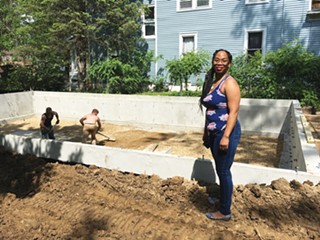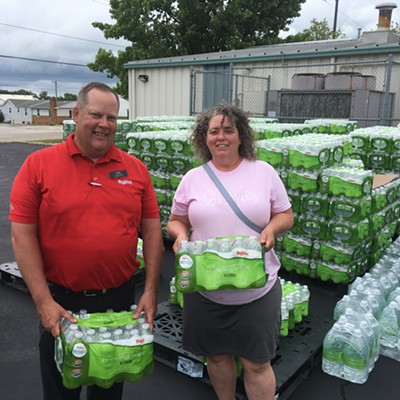Habitat for Humanity of Sangamon County is nearing completion of its newest project on South Glenwood Avenue in Springfield. The four-bedroom, three-bath home is being built on a vacant lot with partial sponsorship from the nearby Westminster Presbyterian Church. It is the 119th project for the nonprofit Christian ministry which opened its doors in Springfield in 1989. Colleen Stone, the organization's director for the past 10 years, tells Illinois Times that the home will be bought by James and Paris Capler of Springfield.
While the organization provides shelter to the needy, the homes are not given away. Potential homeowners must go through a vetting process, which includes financial counseling and mentoring on the responsibilities of home ownership. Program participants must also invest between 250 and 450 hours of sweat equity either in the home being built for them, at the Habitat retail store at 2744 S. Sixth Street or at other home projects managed by Habitat.
For those who successfully complete the program, buying a Habitat home is frequently a life-altering experience. Habitat's mission is to use home ownership to break the cycle of poverty and build long-term financial security. Money saved on housing can be spent on food, child care, medicine and other necessities. According to a study by the University of North Carolina at Chapel Hill, home ownership improves psychological health, lowers exposure to crime, increases civic involvement and improves children's performance at school.
"Qualifying for a Habitat home is not an easy task," says Stone, "nor is it designed to be. Home ownership is a serious responsibility." Habitat sells its homes at appraised value. The organization then issues the homebuyer a mortgage at zero percent interest based upon the buyer's ability to pay. If the buyer successfully makes payments for the home for 10 years the homebuyer may sell the house and keep any profit from the sale. If the home is sold in fewer than 10 years then Habitat and the homebuyer share any equity that might have accumulated in the home.
Habitat makes sure counselors are available to help program participants should they run into any financial trouble. If necessary, alternative financial arrangements can be made until the buyer gets back on track. "We have more at risk than a bank issuing a traditional mortgage, so we have to be good stewards of our donors' money," Stone says. The buyers' monthly payments are lower than they would be with conventional financing, and a buyer's down payment obligation is minimal, usually just a few hundred dollars. This allows Habitat program participants to qualify for more spacious homes with more amenities than they would if they went to a bank.
Paris Capler of Springfield never thought she'd be a homeowner. The 32-year-old nurse assistant and her husband, James, a landscaper, have six children between the ages of five and 15 and sometimes struggle to make ends meet. For years, they watched thousands of dollars a year dissipate in rental payments while they were never able to save enough to pay closing costs, a down payment, and other fees. Then, her mother was accepted into the Habitat homeownership program in 2021. It was like clouds had parted and a ray of sunshine illuminated their path to home ownership. James and Paris applied and were accepted.
The process of qualifying for a home starts with an informational session in which Habitat representatives emphasize to potential applicants that the process can be arduous and frustrating, but well worth it. According to Stone, about 5% of those who attend informational meetings submit an application. About half of those who apply qualify financially for a mortgage. Applicants then meet for an interview with the Habitat board of directors. "The acceptance rate is quite high for those who make it to the interview," Stone says. According to Stone, if applicants bring the desire and ability to accept the duties of caring for a home, Habitat will give them the support, financing and skills to succeed.
The Caplers have volunteered 400 hours with Habitat as a precondition for buying their house at 626 S. Glenwood Ave. and have spent those volunteer hours working at the Habitat Restore retail space as well as Habitat build sites, including their own. "We've formed close friendships with so many other program participants," said Paris. "I wasn't expecting we'd have so many people lend a helping hand. We're really blessed; I didn't think we could do it, but we did."
The Westminster Presbyterian Church is one of the hands that has helped the Caplers become homeowners. It occupies a third of a city block on the corner of Walnut and Edwards, just around the corner from the Caplers' new home. The limestone structure with its dignified Gothic architecture has been a part of the neighborhood for 115 years. According to Dale Rogers, director of music, the decision to become involved in improving the homes around the church was made about 20 years ago. The neighborhood had declined since the church was built, and many members had moved to the far west side of town. Several other large churches had done the same. "We had to decide whether to follow suit or not," said Rogers. The congregation decided to stay put and invest in the neighborhood. "We started the Steadfast Neighbor program, dedicated to improving properties in our own backyard," said Rogers. They began by providing grants to homeowners within a few blocks of the church to make exterior renovations, a program that continues.
About three years ago, the church identified as distressed the buildings and land that would eventually become the site of the Caplers' home and eventually acquired it. The city of Springfield funded demolition of the carriage house while the church paid for demolition of the main house. "It was an elegant property in its day," said Rogers, "but it was just too expensive to rehabilitate." Some in the congregation had participated in Habitat projects in the past, so partnering with the organization to build a new home on the now-vacant lot was an easy decision. Habitat selected the Caplers while church members made in-kind donations and financial contributions to the project. Once construction began earlier this year, congregants also volunteered to work at the building site. Additionally, a church committee meets with the Caplers at least monthly to monitor progress and provide support. "In our congregation we have experienced people from every building trade, and they've been incredibly generous with their time," says Rogers.
Stone says that Habitat works primarily within nine blocks east and west of MacArthur Boulevard south of North Grand Avenue in Springfield. These neighborhoods haven't seen as much new construction in recent years as areas further from the city center, making Habitat an important driver of neighborhood improvement just west of the Capitol. They've also built homes in rural parts of the county. The organization seeks buyers who have enough income to pay a mortgage but don't have the resources for a down payment or don't have the wherewithal to navigate the home-buying process. While Habitat sometimes renovates houses, most of its efforts are on new construction.
Historically, Habitat has had a waiting list for homes. "Ten years ago, there was a five-year waiting list," says Stone. But the COVID-19 pandemic greatly reduced participation in the program, as some applicants lost jobs and the ones that remained employed decided not to move into new homes due to financial uncertainty. Building costs then rose about 30 percent from 2019 to late 2022, knocking some families out of contention for a mortgage. "Today," she says, "we are actually in need of families to apply to the program."
Habitat already has approved buyers for its next two building projects. One is near Lincoln Park, at 610 East Black Ave., where footings have been dug, and the other is at 1305 Ledlie Ave., just south of Lincoln Park. "The Ledlie Avenue build is quite interesting, because it is our 'Women Build' project where we encourage women to take the lead on as many aspects as we can find willing female volunteers," says Stone.
Success story: Decade in a Habitat home
Since its founding in 1989, Habitat for Humanity of Sangamon County has built or renovated 119 houses while providing shelter for more than 500 individuals in need. There are many success stories, including Lori Kolanowski. Kolanowski told Illinois Times she applied for the program in 2011 on a whim. She was a single mom employed as a social worker and was worried about providing a stable environment and a legacy for her 12-year-old daughter. "My father was a pastor and we moved around a lot when I was a child," she said. "I wanted my daughter, Tori, to have roots in a community, like I never had. Habitat made that possible."
Before contacting Habitat, Kolanowski had made a few tentative moves towards buying a home, but always stopped short. "I was nervous about what to do if something in the house breaks, and I was afraid of the buying process," she said. Her experience with Habitat gave her the tools she needed to overcome both of those fears. Calvary Church on West Hazel Dell in Southern View helped sponsor Kolanowski's home, providing meals, volunteers and cash to cover about $3,000 in closing costs. In March 2012 Habitat broke ground on the "perfect location" within walking distance of Springfield High, and the family moved in at the end of the summer. To purchase the three-bedroom home, Kolanowski signed a mortgage for $101,000. Because the loan was at zero interest, her payments were less than $500 per month. "The difference between the amount I paid for a mortgage and the amount I would have paid for a conventional mortgage or rent allowed me to actually save money."
Habitat continued to support Kolanowski after she moved in. She found herself out of work for a while and worried about making her house payments. Habitat simply reduced her payments until her income rebounded. "Try doing that with a bank," she said.
Kolanowski says it was a marvelous experience being involved in the design of the house. She'd just had knee surgery, so she had ramps installed. This feature came in handy when she later had elderly visitors, including her mother. Her daughter got to choose the attic vents and design some of the house's elements, like the window seats. And owning the house meant that Kolanowski was more inclined to develop lasting friendships with her neighbors. Backyard barbecues with others who lived on the block became a regular occurrence, something she never did when she rented.
Kolanowski's daughter, Tori, grew up and moved away. Last year, Kolanowski celebrated 10 years in the home, meaning she was eligible to keep all of the equity in the home. She decided to sell and move to the country, where her dogs could have more space to roam. While she didn't give exact figures about how much she netted from the transaction, she says "the equity I had in my home was life-changing money."
Wheelchair accommodations
"making my life easier"
Dylan Prevost is another Habitat success story. Prevost moved to Springfield in 2013 from Michigan. His brother and sister-in-law live in Springfield and Prevost moved here to be closer to family. Prevost decided to volunteer at Habitat for Humanity of Sangamon County soon after he arrived in town to keep busy while he applied for work.
Within a couple of months Prevost had a job at Goodwill on Dirksen Parkway in the jewelry department. He still sells jewelry at Goodwill, but now works at the Wabash Avenue store. After getting a job, Prevost continued to volunteer at Habitat. It took a couple of years, but after seeing the program up close he finally convinced himself that he could qualify for a Habitat home and he applied in 2019. "I was so frustrated paying outrageous amounts of money for rent," he said.
Prevost uses a wheelchair, and said housing is a particular challenge for persons who need mobility accommodations because many rental properties aren't accessible, and renters who use government housing vouchers must spend months or years on a waiting list. Then, if the renter gets a job, the amount of the voucher is reduced so that the renter is never able to save the extra money from increased income.
Prevost has high praise for the classes that Habitat program participants attend before buying a home. "They teach you how to be financially responsible, how to manage your money," he said. Habitat helps participants resolve credit issues and gives them classes in home maintenance. He credits the training with making him fully prepared to own a home.
Prevost now lives in a home that was especially designed for him, something which would have been impossible otherwise. The kitchen and living room comprise one big open space. There are no corridors and the bathroom is wheelchair-accessible. His bedroom closet is equipped with sliding doors rather than swinging ones and is large enough to allow him to turn his wheelchair 360 degrees without knocking anything over. "This house is geared towards making my life easier, so I don't have to struggle with everything," Prevost said. "I can't imagine not having my own home anymore. I just love it."
Prevost moved into his new home at 1430 S. Seventh St. in April 2020 after COVID-19 caused some delays in construction. He says it seems surreal to him that he could live independently in a custom-built home for less than he would otherwise pay for rent. He remains a committed Habit volunteer and would like to see the program expanded. "It would be a blessing if there were more who had this opportunity."
Just a few blocks from Prevost's home, workers install doors, frames and molding the Caplers helped paint just the weekend before. This spring's weather has been a challenge to keeping the project on schedule, but James and Paris Capler look on the construction site with confidence engendered from what they've seen Habitat accomplish. Like Lori Kolanowski and Dylan Prevost, they appreciate how life-altering it is to advance from renting to owning.
The Caplers say the stability provided by home ownership is a big deal for a family with six children. "Our kids seem to move in every direction all at once," says James as he supervises a teenage painter. Two of their children participate in Girls on the Run Central Illinois where youngsters learn life skills and teamwork while training for a 5K run that everyone completes together. "I'm so glad they go there to work off energy and learn important lessons about navigating the world, the kinds of lessons you don't learn in school. A lot like the Habitat classes," says James. "Our family has achieved a lot together this past year, with the help of so many people."
Habitat's life-changing next house
While the Caplers' house will not be finished until the end of June, Habitat has already been hard at work on the next house, for Pacie Spaulding and Isiah Johnson at 610 E. Black Ave. in Springfield. They have two teenagers, and they are buying a home for the first time. As Pacie watches workers build the foundation of her new home, she shakes her head in disbelief. "I'm still in shock," she says. "At the beginning everything moved so slow, but now it's moving fast." Pacie works at the President Abraham Lincoln Hotel and is grateful that she's been allowed to take time off to help build a dream for her family. "We couldn't have done this without the support of a lot of people," she says. "Our lives have been completely changed."
Isiah and Pacie both said they learned a lot about money management and finance from Habitat and Carrollton Bank, which helped them manage their credit so they could qualify for the loan. The volunteer work they did for Habitat also gave them practical skills for maintaining their new home. "I know a lot of people who are afraid of taking on the responsibility of home ownership," says Pacie. They shouldn't be, she says. Besides, even when they were renting, they ended up fixing roofing, flooring and even toilets when landlords didn't respond to problems. Isiah says anyone who's tired of renting and interested in becoming a new homeowner through Habitat should call their office at 217-523-2710.
Don Howard is an intern at Illinois Times while completing his master's degree in Public Affairs Reporting at University of Illinois Springfield. He can be reached at [email protected] or 336-455-6966.

























